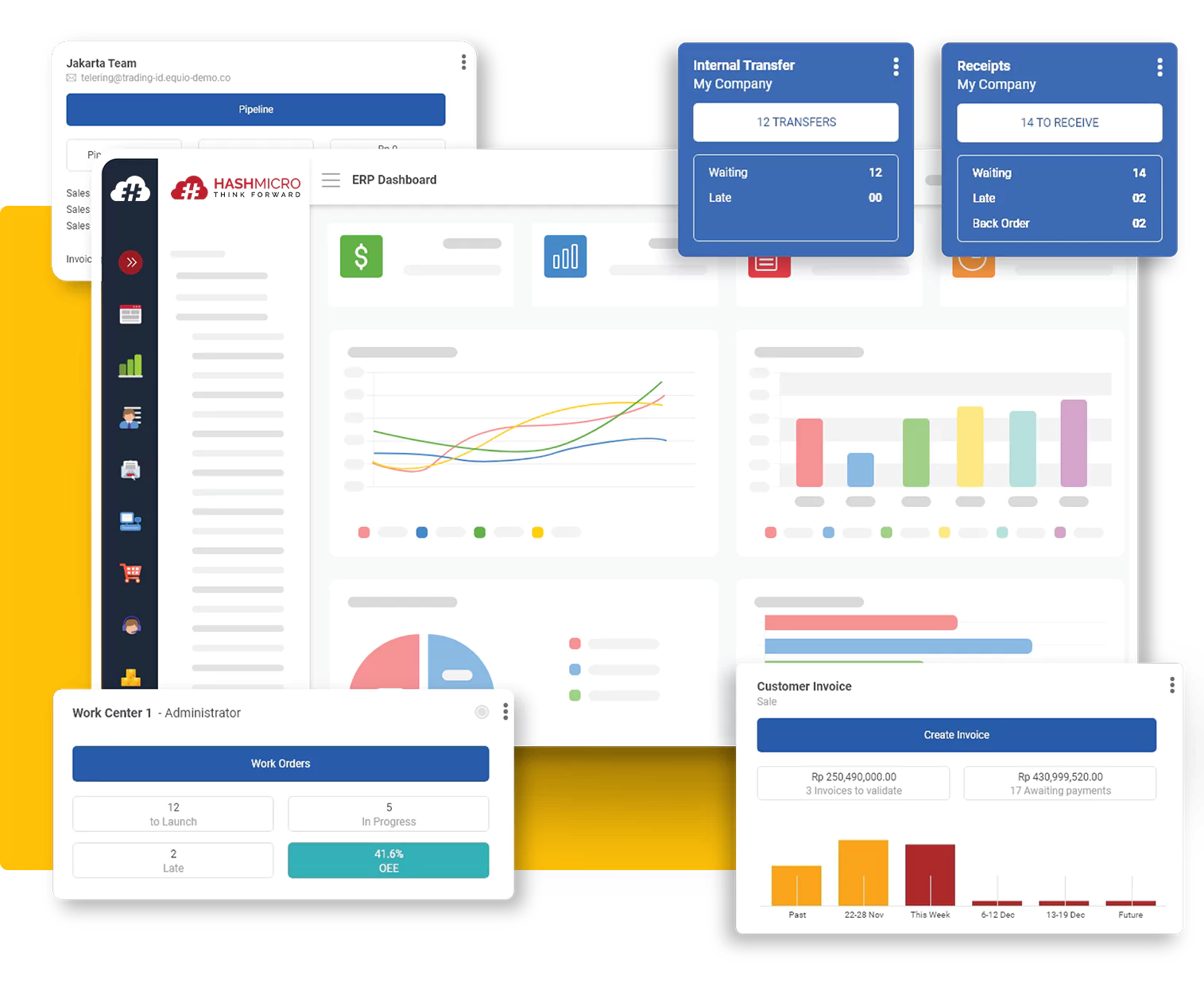As a business owner in today’s fast-paced world, I’ve learned that moving fast isn’t just about speed; it’s about efficiency. Every wasted minute or mismatched system can hold your business back while competitors race ahead.
Many companies still rely on disconnected tools and outdated manual processes. I’ve seen how these inefficiencies slow operations, drain resources, and make it nearly impossible to scale.
That’s where ERP software comes in. It centralizes operations, boosts productivity, and secures your business data, helping you stay agile and ahead of the competition. In this article, I’ll share what ERP is and how to choose the right system for your business.
Key Takeaways
|
What is ERP Software and Why Does It Matter?
ERP software helps businesses plan how to allocate resources so every department has the resources it needs to carry out tasks. The point of this is to integrate core business processes into one seamless, streamlined experience.
By connecting functions like finance, inventory, HR, and sales in a single platform, ERP systems eliminate data silos and improve collaboration across teams. This unified approach gives leaders real-time visibility into operations, enabling faster decision-making.
The Importance of ERP Software
An ERP software tool is essential for many reasons. It serves as the backbone of modern business operations, ensuring all processes and departments work in sync toward shared goals.
An ERP software tool is important for many reasons:
- Centralized data management: ERP systems put all the data from different departments in one place so each relevant department can access it easily.
- Real-time insights: This tool offers instant insights after analyzing data to show the best ways to allocate resources for every team in the organization.
- Improved collaboration: Allowing everyone to access data from the same location promotes collaboration.
Key Benefits of ERP Software

There are many benefits to using ERP software, which is why it is so popular and a requirement to compete in any market. One key benefit is the efficiency brought about by automation.
-
Efficiency and automation
An ERP can automate routine tasks automatically without needing human input. Doing so reduces errors that humans sometimes make and saves staff time so they can focus on more complex and innovative tasks that machines cannot carry out.
ERP tools can also promote real-time data flow that gives leaders the data they need to make key decisions using the latest data, reducing risk and promoting innovation.
-
Improved collaboration
Collaboration is key in any organization and an ERP system can promote it by becoming a hub for data that every member of staff uses. This configuration breaks down data silos, where staff only store data in their department without sharing.
It is also great for interdepartmental communication because departments can share data and build new processes that streamline organizational processes.
-
Scalability and growth
Scalability and growth are children’s play with ERP systems because they are adaptable and grow with the business, changing size and form to fit your needs, just like Legos.
Integrations can adjust to new software purchases to meet your evolving needs and fit in with whatever you require at any time, to ensure you always have a hub that adapts in whichever you need it.
-
Lower risk
ERP software helps reduce business risks by providing accurate, real-time data that minimizes the chance of human error and poor decision-making. With automated workflows and built-in controls, companies can detect inconsistencies early.
It also enhances transparency across operations, making it easier to monitor performance and spot potential issues before they escalate. This proactive approach not only protects the company’s assets but also builds stakeholder confidence.
-
Improved agility
In a fast-changing business environment, agility is key to staying competitive. ERP systems give organizations the flexibility to adapt quickly to market changes by offering a unified view of operations, allowing for faster, data-driven decisions.
With automated updates and scalable modules, businesses can respond to new opportunities or challenges without significant disruptions. This adaptability empowers companies to innovate and evolve in sync with customer needs and industry trends.
-
Accelerated reporting
ERP software streamlines the reporting process by automatically gathering and organizing data from all departments. This eliminates manual work, reduces errors, and delivers accurate reports in a fraction of the time.
Real-time dashboards and analytics also enable management to track performance instantly and make informed decisions. Faster and more reliable reporting means businesses can identify trends early and optimize processes.
Here is a table summary of the key benefits of ERP software
| Key Benefits | Description |
| Efficiency and automation | ERP systems automate repetitive tasks, reducing human error and saving time for more strategic work. They also enable real-time data flow, helping leaders make faster, data-driven decisions. |
| Improved collaboration | By centralizing data, ERP software breaks down silos and enhances communication between departments. Teams can easily share information and coordinate processes to boost overall productivity. |
| Scalability and growth | ERP systems grow with your business. Their flexible integrations adapt to new tools and changing needs, ensuring your operations stay efficient as you expand. |
| Lower risk | ERP software minimizes business risks by providing accurate, real-time data and automated workflows that reduce human error. It also improves transparency and resolves issues early to protect assets. |
| Improved agility | In a fast-moving market, ERP systems enable businesses to adapt quickly through real-time insights and flexible, scalable modules. This agility helps companies stay ahead of competitors. |
| Accelerated reporting | ERP software automates data collection and reporting, cutting manual work and errors. With real-time dashboards and analytics, management can make faster, data-driven decisions. |
Cybersecurity and ERP: Protecting Your Business
The main risk with ERPs is that you store massive amounts of information from every department in one place. A malicious party, like a hacker, could steal all or large portions of it and sell it to competitors.
The solution to this serious issue is to implement robust and effective cybersecurity measures. Continuous security validation is one of the most effective defenses against ERP cyberattacks.
Continuous security validation continuously checks every security protocol in an ERP system to make sure they all work effectively and there are no vulnerabilities hackers could exploit to gain access to files.
Choosing the Right ERP System
 Selecting the best ERP software requires evaluating several key factors to ensure it fits your business needs today and in the future. Here’s what to look for:
Selecting the best ERP software requires evaluating several key factors to ensure it fits your business needs today and in the future. Here’s what to look for:
- Scalability: Choose an ERP system that can grow with your organization. A scalable solution allows you to expand data capacity and add new features as your business evolves.
- Integration Capabilities: The right ERP software should connect seamlessly with other tools you already use, such as CRM, accounting, and HR systems. Integration ensures smooth data flow and efficient collaboration across departments.
- Strong Security Features: Protecting sensitive data is non-negotiable. Look for robust encryption, access control, and security validation tools to prevent unauthorized access and data breaches.
- Customizability: Your ERP system should adapt to your business model, not the other way around. Opt for a solution that allows flexible customization to fit your company’s specific processes.
- Vendor Support: Reliable vendor support is crucial for long-term success. Ensure your ERP provider offers ongoing training and assistance to help employees adapt to the new system with confidence.
Streamline Your Business Operations with HashMicro’s ERP Software

HashMicro’s ERP Software provides an all-in-one solution to simplify and automate complex business processes across various departments. From finance and inventory to HR and sales, this system ensures seamless integration and real-time visibility.
The software offers high flexibility, allowing companies to customize workflows that align with their unique operational structures. With powerful automation tools, HashMicro empowers businesses to build a transparent, efficient, and scalable management system.
Here are some of the key features of HashMicro’s ERP System that help streamline your operations:
- Automated Financial Reconciliation: Automatically matches and verifies transactions to ensure accurate and up-to-date financial records.
- Real-Time Data Synchronization: Keeps all departments aligned with live updates, minimizing data silos and enhancing collaboration.
- Predictive Analytics: Identifies potential discrepancies, tracks performance trends, and helps forecast operational outcomes based on historical data.
- Comprehensive Reporting: Generates precise, real-time reports that support better managerial and strategic decision-making.
- AI-Powered Insights with Hashy AI: Detects anomalies, analyzes process inefficiencies, and provides intelligent recommendations for continuous improvement.
Conclusion
Whether you run a large enterprise or a small business, ERP software has become essential for every modern company. If your business hasn’t implemented one yet, now is the perfect time to invest.
HashMicro ERP system acts as the central hub for all your company data, eliminating silos, improving collaboration, and enabling smarter decision-making. However, since it holds critical business information in one place, maintaining strong cybersecurity is vital.
HashMicro offers everything you need to streamline operations, boost productivity, and stay ahead of the business competition. Try the free demo and experience the difference yourself.

Frequently Asked Questions
-
Why is ERP software essential for business competitiveness?
ERP software centralizes data from all departments, allowing businesses to make faster and more accurate decisions. It automates key operations, such as finance, inventory, and HR—helping companies save time, reduce costs, and respond quickly to market changes.
-
How does ERP software improve productivity and efficiency?
By integrating all business processes into one system, ERP eliminates repetitive manual tasks and minimizes errors. This gives teams access to real-time information, allowing them to collaborate better and focus on value-driven work instead of administrative tasks.
-
Is ERP software suitable for small and medium-sized businesses?
Yes. Modern ERP solutions are scalable and flexible, meaning they can grow with your business. Even small and medium enterprises can benefit from better visibility, cost control, and streamlined operations without the complexity of traditional enterprise systems.

































